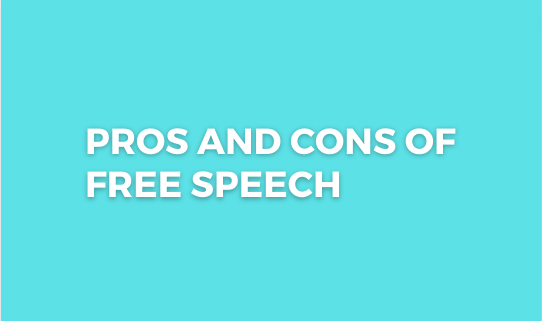Free speech refers to the fundamental right of individuals to express their opinions, ideas, beliefs, and viewpoints without censorship, interference, or punishment from the government or other entities. It is an essential component of a democratic society and is typically protected by law in many countries. Here are 20 pros and 20 cons of living in a society that respects and protects free speech:
Pros:
- Expression of Ideas: Free speech allows individuals to express their ideas, opinions, and beliefs freely.
- Promotes Open Dialogue: It encourages open dialogue and the exchange of diverse perspectives, fostering intellectual growth and understanding.
- Enhances Democracy: Free speech is essential for a functioning democracy, enabling citizens to participate in political discussions and hold those in power accountable.
- Catalyst for Social Change: It serves as a catalyst for social change, empowering marginalized groups to speak up and challenge injustices.
- Encourages Innovation: Free speech promotes innovation and intellectual progress by allowing individuals to share and build upon ideas.
- Protects Minority Rights: It safeguards the rights of minority groups, ensuring their voices are heard and their concerns are addressed.
- Critical Thinking Skills: Free speech encourages critical thinking skills as individuals engage in thoughtful analysis and evaluation of different viewpoints.
- Cultural Enrichment: It allows for the preservation and celebration of diverse cultural expressions, enriching society as a whole.
- Educational Environment: Free speech in educational settings promotes intellectual curiosity, open-mindedness, and the pursuit of knowledge.
- Peaceful Conflict Resolution: It provides a platform for peaceful conflict resolution through dialogue and understanding.
- Media Accountability: Free speech enables media scrutiny, ensuring the accountability of the press and promoting transparency.
- Individual Empowerment: It empowers individuals to stand up for their rights and fight against oppression and injustice.
- Promotes Tolerance: Free speech fosters tolerance and acceptance by exposing individuals to different perspectives and ideas.
- Supports Personal Growth: It allows individuals to express their identity, values, and personal growth without fear of repression.
- Encourages Civic Engagement: Free speech encourages civic engagement and active participation in public affairs.
- Scientific Advancement: It facilitates scientific research and advancement by encouraging the sharing of knowledge and collaboration.
- Social Bonding: Free speech promotes social bonding by creating opportunities for meaningful conversations and connections.
- Prevents Authoritarianism: It serves as a safeguard against authoritarianism by allowing the public to voice dissent and challenge oppressive regimes.
- Creative Expression: Free speech nurtures artistic and creative expression, fostering cultural and artistic diversity.
- Human Rights Advocacy: It plays a crucial role in advocating for human rights, social justice, and equality.
Cons:
- Hate Speech: Free speech can enable the spread of hate speech and discriminatory rhetoric.
- Incitement of Violence: It may allow for the incitement of violence or harm against others.
- Misinformation and Fake News: Free speech can contribute to the dissemination of misinformation and fake news, leading to confusion and distrust.
- Threats to National Security: It poses challenges in dealing with potential threats to national security, such as the spread of extremist ideologies.
- Invasion of Privacy: Free speech can sometimes infringe upon an individual’s right to privacy.
- Cyberbullying and Online Harassment: It can facilitate cyberbullying and online harassment, causing harm and emotional distress.
- Polarization and Division: Free speech can contribute to polarization and division within society.
- Commercial Manipulation: It may enable deceptive advertising practices and manipulative propaganda.
- Spread of Hate Groups: Free speech can provide a platform for hate groups to amplify their ideologies and recruit new members.
- Threats to Public Safety: It can present challenges in dealing with the spread of false information during emergencies or crises.
- Intolerance and Discrimination: Free speech can be used as a tool to perpetuate intolerance and discrimination against marginalized communities.
- Censorship Concerns: In some cases, the regulation of free speech can lead to concerns of censorship and infringement on individual liberties.
- Social Media Echo Chambers: Free speech can contribute to the formation of social media echo chambers, where individuals are only exposed to like-minded opinions.
- Exploitation and Cybercrime: It can provide opportunities for the exploitation of vulnerable individuals and cybercrime.
- Emotional and Psychological Harm: Free speech, when used irresponsibly, can cause emotional and psychological harm to individuals.
- Threats to Public Order: It may create challenges in maintaining public order and managing potential conflicts.
- Suppression of Minority Voices: Free speech, if not protected adequately, can result in the suppression of minority voices and perspectives.
- Manipulation of Public Opinion: It can be used as a tool to manipulate public opinion and shape narratives for political gain.
- Interference in Elections: Free speech can open avenues for foreign interference in electoral processes and the spread of disinformation.
- Balancing Conflicting Rights: It poses challenges in balancing conflicting rights, such as freedom of speech versus the right to be free from discrimination.
Pros
- Expression of Ideas
- Promotes Open Dialogue
- Enhances Democracy
- Catalyst for Social Change
- Encourages Innovation
- Protects Minority Rights
- Critical Thinking Skills
- Cultural Enrichment
- Educational Environment
- Peaceful Conflict Resolution
- Media Accountability
- Individual Empowerment
- Promotes Tolerance
- Supports Personal Growth
- Encourages Civic Engagement
- Scientific Advancement
- Social Bonding
- Prevents Authoritarianism
- Creative Expression
- Human Rights Advocacy
Cons
- Hate Speech
- Incitement of Violence
- Misinformation and Fake News
- Threats to National Security
- Invasion of Privacy
- Cyberbullying and Online Harassment
- Polarization and Division
- Commercial Manipulation
- Spread of Hate Groups
- Threats to Public Safety
- Intolerance and Discrimination
- Censorship Concerns
- Social Media Echo Chambers
- Exploitation and Cybercrime
- Emotional and Psychological Harm
- Threats to Public Order
- Suppression of Minority Voices
- Manipulation of Public Opinion
- Interference in Elections
- Balancing Conflicting Rights



